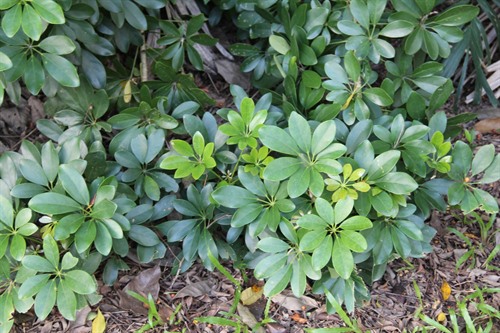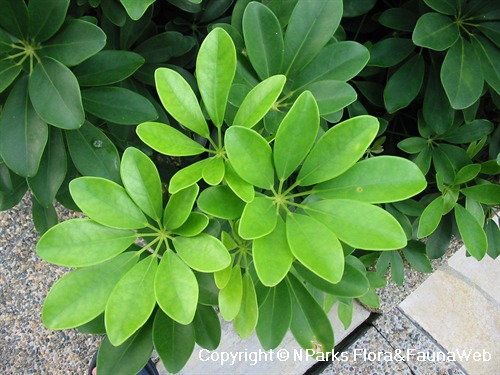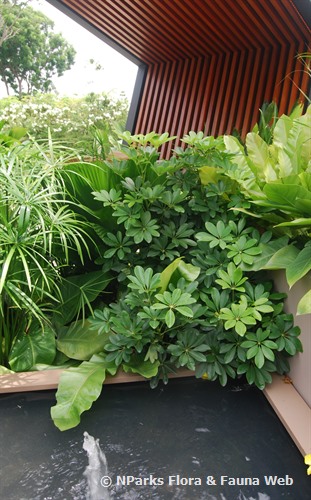
Back
Heptapleurum arboricola Hayata
| Family Name: | Araliaceae |
| Synonyms: | Schefflera arboricola (Hayata) Merr. |
| Common Name: | Dwarf Umbrella-Tree, Umbrella Shrub, Star Leaf, Hawaiian Elf Schefflera, Hawaiian Elf |
The Dwarf Umbrella-Tree (Heptapleurum arboricola) has attractive, glossy palmate leaves comprising 7 to 9 oval leaflets arranged in a whorl, resembling the spokes of an umbrella. In its native range of Hainan and Taiwan, this evergreen shrub is found growing along stream banks, wet forests and sometimes epiphytic on trees. It is commonly planted in Singapore as a hedge and screening plant and does best in semi-shade on well-drained, moist soil.
Name
Classifications and Characteristics
| Plant Division | Angiosperms (Flowering Seed Plants) (Dicotyledon) |
|---|---|
| Plant Growth Form | Shrub |
| Lifespan (in Singapore) | Perennial |
| Mode of Nutrition | Autotrophic |
| Maximum Height | 4 m |
Biogeography
| Native Distribution | Hainan and Taiwan |
|---|---|
| Native Habitat | Terrestrial |
| Preferred Climate Zone | Tropical |
| Local Conservation Status | Non-native |
Description and Ethnobotany
| Growth Form | Evergreen shrub, sometimes climber, able to grow up to 4 m tall. |
|---|---|
| Foliage | Leaves are subleathery, palmately compound, each leaf containing 7 - 9(or 10) leaflets, obovate-oblong to oblong or elliptic in shape and measuring 6 - 10(-12) cm long and 1.5 - 3.5(-4.5) cm wide. Leaf blade has glabrous surfaces on both sides, base cuneate, apex obtuse or abruptly acute, margin entire. |
| Flowers | Red tiny flowers borne in a panicle of umbels, located on the stem terminal. |
| Fruit | Fruit is an orange drupe which becomes black upon maturity. Fruit is subglobose, about 5 mm in diameter, 5- or 6-ribbed when dry. |
| Habitat | In its native habitat, it is found growing along the stream banks and wet forests, sometimes epiphytic, at an altitude of below 900 m. |
| Etymology | The specific epithet in the second part of the scientific name 'arboricola' means 'living on trees'. |
Landscaping Features
| Landscaping | Attractive glossy bright green leaves comprised of leaflets arranged in a circle-like spokes of an umbrella. |
|---|---|
| Desirable Plant Features | Ornamental Foliage |
| Landscape Uses | Parks & Gardens, Small Gardens |
Plant Care and Propagation
| Light Preference | Semi-Shade, Full Sun |
|---|---|
| Water Preference | Moderate Water |
| Plant Growth Rate | Moderate |
| Rootzone Tolerance | Easy to Grow, Drought Tolerant, Well-Drained Soils |
| Potential Problems | May be susceptible to spider mites if grown as indoor plant. Rarely affected when grown outdoors. |
| Pest(s) | Sucking Insects |
Foliar
| Foliage Retention | Evergreen |
|---|---|
| Mature Foliage Colour(s) | Green |
| Mature Foliage Texture(s) | Leathery, Smooth |
| Prominent Young Flush Colour(s) | Green |
| Young Flush Texture(s) | Smooth |
| Foliar Type | Compound (Palmate) |
| Foliar Attachment to Stem | Petiolate |
| Foliar Shape(s) | Non-Palm Foliage (Palmate) |
| Foliar Venation | Pinnate / Net |
| Foliar Apex - Tip | Acute, Obtuse |
| Foliar Base | Cuneate |
| Leaf Area Index (LAI) for Green Plot Ratio | 4.5 (Shrub & Groundcover - Dicot) |
Non - Foliar and Storage
| Root Type | Underground |
|---|
Floral (Angiosperm)
| Flower & Plant Sexuality | Bisexual Flowers |
| Flower Grouping | Cluster / Inflorescence |
|---|---|
| Flower Location | Terminal |
| Flower Symmetry | Radial |
| Inflorescence Type | Panicle |
| Flowering Habit | Polycarpic |
| Inflorescence Type Remarks | The inflorescence is a terminal panicle of umbels. |
Fruit, Seed and Spore
| Mature Fruit Colour(s) | Red, Purple |
|---|---|
| Fruit Classification | Simple Fruit |
| Fruit Type | Fleshy Fruit , Drupe |
References
| References | <1> eFloras (2008). https://www.efloras.org. Accessed on 3 July 2024 |
|---|
Image Repository
Others
| Master ID | 1139 |
|---|---|
| Species ID | 2432 |
| Flora Disclaimer | The information in this website has been compiled from reliable sources, such as reference works on medicinal plants. It is not a substitute for medical advice or treatment and NParks does not purport to provide any medical advice. Readers should always consult his/her physician before using or consuming a plant for medicinal purposes. |







